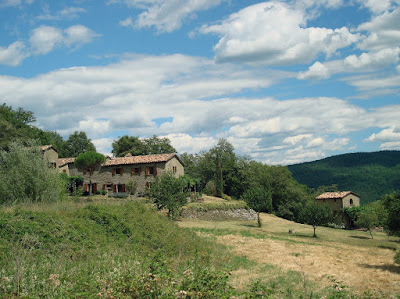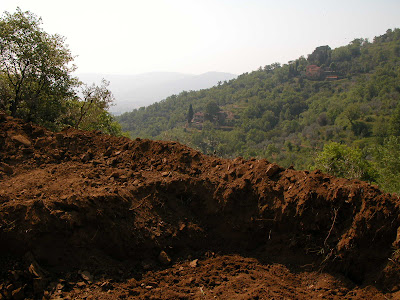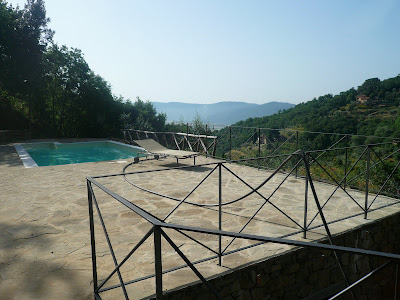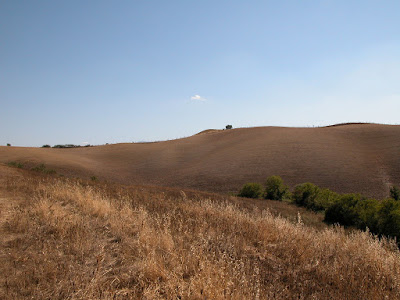 The pioneers of Italian living
The pioneers of Italian livingPublished by the Sunday Times
Twenty years ago, the author Imogen Edwards-Jones was shocked when her parents moved to Tuscany but it turned out to be a great idea
Property in Italy
When my mother announced, 20 years ago, that she was selling up and moving to Italy, I thought she was joking. People just didn’t do that sort of thing in those days. There were no property programmes, no relocating shows, no glamorous presenters in flowered frocks poring over websites and telling us how to make the best of the burgeoning Spanish/Italian/Croatian markets. What on earth was she talking about? As far as I was concerned, she and my stepfather, then in their mid-forties, had a perfectly nice house in Dorset and were happy.
Apparently not. They’d been on holiday to Italy, they’d fallen in love with the art, the food, the wine, the people, the scenery and the life, and they wanted in. The south coast of England was “too crowded”, my mother kept saying. The traffic, the noise, the thousands of people who packed the place in the summer, licking ice creams, mooching around Corfe Castle, clogging the roads to the beach. They’d had enough, and were off.
I watched the two of them spend the next six months researching and writing to agents - no websites in those days - but still wasn’t convinced they were serious. They spent a couple of weeks looking around Lucca. Everyone said, in those preRyanair days, that you had to be near Pisa airport, but after finding nothing worth giving it all up for, they headed south to the Etruscan walled hilltop town of Cortona.
They arranged to meet Anthony Dun-kley, an agent who lived in Tuscany and was one of the pioneers of the British invasion, in a bar in the small village of Mercatale. My mother went off to try to get money from a bank, while my stepfather waited at the bar. Mother returned raving about some drop-dead handsome Greek god she had just seen in the bank, only for him to turn out to be the agent they were waiting for.
Several months later, my sister, then aged 18, and I, just turned 20, were sitting in the back of the car, eyes strained left and right, looking for our mother’s new house. My stepfather was at the wheel, spitting feathers as he drove up and down the hillside. My mother kept swearing - indeed, swearing blind - that the house was “really nearby somewhere”. After much huffing and puffing, we found an overgrown track nobody could quite believe was passable.
“It does need some work,” my mother finally admitted as we pulled up at the end of the half-mile drive.
“Work?” replied my sister, peering through the bushes. “There’s a tree growing through the roof.” “And no doors or windows,” I added. “The place is a wreck.”
“But the position,” my mother said, getting out of the car. “The position is to die for.” She was right. South-facing, 1,500ft or so up and sheltered against the side of a hill, Stoppiacce was - and still is - one of the most beautifully positioned houses I have ever seen. Cool in summer and warm in a dank Italian winter, it gets sun all day, all year round, and has uninterrupted views over the rolling hills of the Minimella valley – a protected no-build zone that, according to locals, is about to be designated a national park.
Yet as I stood there, with the sun sinking below the horizon, I couldn’t believe she was uprooting the family home and moving it here, to a ruin in the middle of nowhere. Little did I know that this hillside wreck would play such a huge part in my life. It would be a place I’d return to again and again for inspiration and solitude. Where I would write my novels, my articles, my bestsellers Hotel Babylon and Fashion Babylon; where I would eventually get married.
Back then,
Stoppiacce had no roof, no water, no electricity and no telephone, and hadn’t been lived in for 30 years. The farmer who’d owned it had run the well dry and couldn’t afford to sink a new one. Old Cerrotti, who bought it from him, wanted the land and the timber: he discovered only later that crazy foreigners were willing to buy the ruined houses cluttering his fields. So, when he needed a new tractor or car, he sold a house.
Even in the dusk, we could appreciate that it was a pretty house. The walls were square and sound - some dated from the 13th century, others from the 17th and 19th. Accommodation was on the first floor, with animals and stores on the ground. There were beautiful stone slabs, which would eventually be used to build the terraces. There was a tall tobacco-drying tower and a small, fat chestnut barn, which would eventually become stunning bedrooms with ensuite bath-rooms and views to the valley floor. As my sister and I picked our way through the rubble, a skinny ginger cat shot out of the bread oven when we peered in. This was certainly “a project”.’ For the next few years, I spent university holidays chipping away at old plaster, shifting blocks of stone, painting, weeding, pruning, drinking wine, eating delicious food and laughing. My mother and stepfather moved into a smaller house close by, blew up their inflatable mattresses and, every day, reported for work at the house. The renovation took about 18 months. It could have been quicker had the British builders my mother found somewhere not suffered from such horrendous hangovers.
When they finished, though, the place was fantastic. Five bedrooms, five bath-rooms, five reception rooms – a library, a sitting room, a drawing room, a stunning hall, a large kitchen/dining room – as well as a swimming pool and a collection of terraces and various outside storage areas. It was 25 minutes from Cortona, where Frances Mayes came to write Under the Tuscan Sun, and where they filmed Life Is Beautiful.
Florence is two hours away, Perugia one. Most of Tuscany’s varied and beautiful sights are only a road trip away. My mother and stepfather said we were welcome to stay whenever we wanted, and my sister, brother and all our friends took them at their word.
We steamed in every summer, packing out the house, eating my mother’s delicious food, watching the fireflies on the terrace, chugging back the wine – which they, and sometimes we, bottled. Their village, San Pietro a Dame, was sleepy and small, and foreigners were few and far between. There was a documentary film-maker from London across the valley and a well-known thespian a few hills away, but that was it. The Chiantishire invasion was yet to happen and, as Brits abroad, my mother and stepfather kept a low profile, integrating slowly and politely into the society in which they lived. They went to the local mushroom-picking feast and the cheese-rolling competition, but, on the whole, they were quiet. The farmers got used to their red setters; my mother quickly became obsessed by the salt-covered baby broad beans served in the local restaurant; and my stepfather learnt from his literal close shave at the hairdressers that abbastanza doesn’t mean “a little bit of a trim”, but rather “sufficient” – that is, just enough hair to cover his head.
They always cite my wedding, nearly 10 years ago, to Kenton Allen, head of comedy talent at the BBC, as the time they became fully fledged members of the community. We had 120 guests crammed into the tiny, fresco-covered village church. We dined on roast sucking pig while a big band played around the swimming pool. Half the village drove the guest buses to and from Cortona; the other half did the flowers, the food, our hair or turned up to look at these foolish English in their big hats at the church. Old Cerrotti said: “Ah, so they do live here, after all.”
Soon after that, the world, his wife and their friends poured into Tuscany. Under the Tuscan Sun became a huge international bestseller and Cortona was captured from every angle on film and digicam. Stoppiacce, however, maintained its serene hillside calm and became a haven for resting actor friends recuperating from long filming schedules.
I was beginning to sense, though, that my mother and stepfather had had enough. They were getting itchy, looking for another project and, like every other foreign holiday-house purchaser, regularly surfing the net for a new place.
“We’re off to Gascony,” my mother declared over lunch a few months ago. “I’ve found this place,” she smiled. “It needs some work.”
This time, I took her seriously. Stoppiacce is for sale for £776,000 with Abode
(00 39 075 573 3941, www. abode.it) Pop Babylon by Imogen Edwards-Jones is published tomorrow by Bantam Press at £12.99 Tuscan idylls


